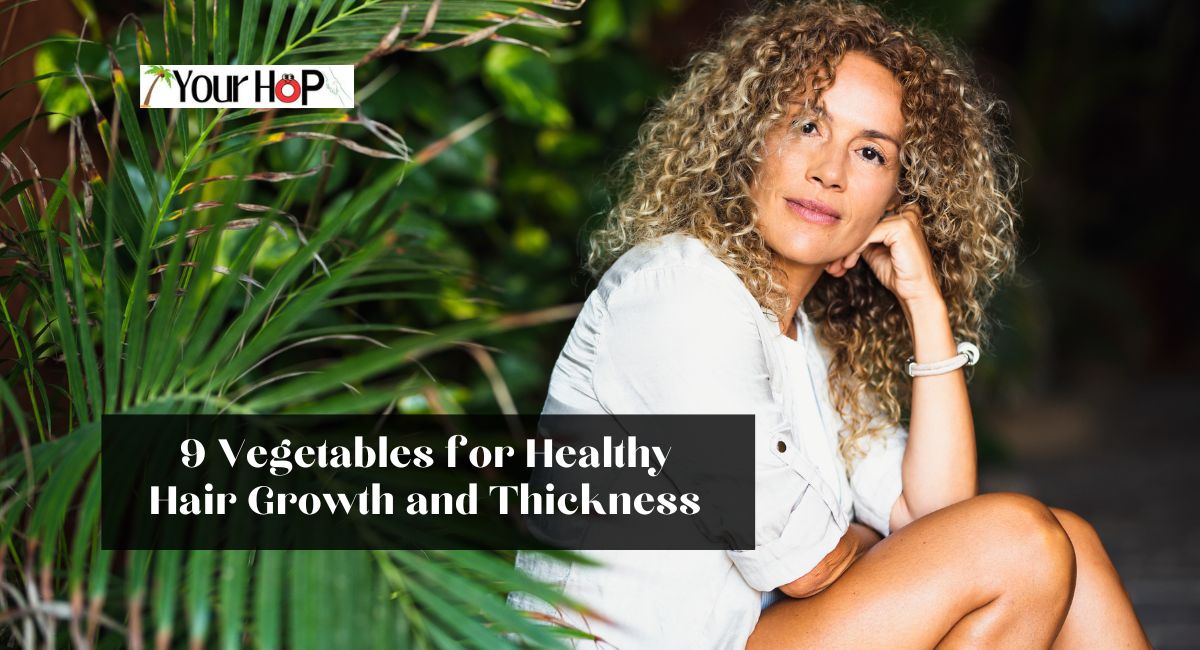Healthy hair is often seen as a symbol of vitality and wellness, reflecting the internal health of our body. While numerous products promise to enhance hair growth and thickness, the foundation of truly healthy hair lies in our diet. Vegetables, with their dense nutrient profiles, play a pivotal role in supporting hair health. This guide explores nine powerful vegetables that can contribute to hair growth and thickness, backed by science and nutrition.
The Connection Between Diet and Hair Health
Hair growth and quality are directly linked to the nutrients we consume. Deficiencies in vitamins, minerals, and other nutrients can lead to hair loss, thinning, and a lack of luster. Incorporating a variety of vegetables into your diet ensures a supply of essential nutrients required for optimal hair health.
Vegetables That Promote Hair Growth and Thickness
1. Spinach
Nutrient Profile: Rich in vitamins A and C, iron, folate, and magnesium.
Benefits for Hair: Spinach is a powerhouse for hair health. Vitamin A aids in sebum production, keeping hair moisturized. Iron helps red blood cells carry oxygen throughout the body, supporting metabolism and aiding in growth and repair.
How to Incorporate: Add spinach to salads, smoothies, or as a steamed side dish to maximize its benefits for hair health.
2. Sweet Potatoes
Nutrient Profile: High in beta-carotene, which the body converts into vitamin A.
Benefits for Hair: Vitamin A from beta-carotene promotes sebum production, preventing hair dryness. It also encourages the growth of thicker hair and speeds up the rate of hair growth.
How to Incorporate: Roast, mash, or include sweet potatoes in soups and stews for a nutritious boost to your meals and hair health.
3. Carrots
Nutrient Profile: Another excellent source of beta-carotene and vitamin A.
Benefits for Hair: Like sweet potatoes, carrots offer vitamin A for sebum production and overall hair health. They also strengthen hair and prevent breakage.
How to Incorporate: Incorporate carrots into your diet as snacks, in salads, or juiced for a healthful benefit to your hair and overall health.
4. Avocados
Nutrient Profile: Loaded with healthy fats, vitamin E, and omega-3 fatty acids.
Benefits for Hair: The vitamin E in avocados enhances blood circulation and helps follicles work more efficiently, promoting hair growth. The healthy fats are crucial for maintaining and strengthening hair follicles.
How to Incorporate: Avocados are versatile. Enjoy them in salads, on toast, or blended into smoothies to support hair health.
5. Bell Peppers
Nutrient Profile: Exceptionally high in vitamins A and C.
Benefits for Hair: The vitamin C in bell peppers aids in collagen production, which strengthens hair strands. Vitamin A supports healthy sebum production, keeping hair moisturized.
How to Incorporate: Add raw or cooked bell peppers to dishes for a colorful, nutritious addition that benefits your hair.
6. Broccoli
Nutrient Profile: Rich in vitamins C and A, iron, and calcium.
Benefits for Hair: Broccoli is packed with vitamin C, which aids in collagen production, enhancing hair strength. The iron in broccoli helps in combating hair loss associated with iron deficiency.
How to Incorporate: Steam, roast, or add raw broccoli florets to salads. Broccoli can also be blended into soups or used as a side dish.
7. Kale
Nutrient Profile: A powerhouse of vitamins A, C, and K, along with iron and calcium.
Benefits for Hair: Kale’s high vitamin C content improves iron absorption, crucial for hair growth. Vitamins A and C both contribute to sebum production and collagen synthesis, respectively, fostering a healthy scalp and hair.
How to Incorporate: Incorporate kale into smoothies, salads, or as chips for a crunchy, nutritious snack that benefits your hair.
8. Beets
Nutrient Profile: Excellent source of folate, manganese, potassium, and iron.
Benefits for Hair: Beets stimulate hair growth due to their high content of nitrates, which improve blood circulation to the scalp. Iron in beets helps carry oxygen to hair follicles, essential for healthy hair growth.
How to Incorporate: Roast, boil, or juice beets to enjoy their hair health benefits. They can also be added to salads for a nutritious punch.
9. Tomatoes
Nutrient Profile: High in vitamins C and E, potassium, and lycopene.
Benefits for Hair: Tomatoes are rich in antioxidants, particularly lycopene, which protects hair against damage from free radicals. Vitamin C helps in collagen production, ensuring hair strength and elasticity.
How to Incorporate: Enjoy tomatoes in salads, soups, sauces, or simply raw to harness their benefits for hair health.
Additional Tips for Maximizing Hair Health Through Diet
Balance is Key: While the vegetables listed provide essential nutrients for hair health, overall dietary balance is crucial. Include a variety of foods to ensure you’re getting a comprehensive range of nutrients.
Hydration Matters: Drinking enough water is essential for maintaining the health of your hair and scalp, as hydration impacts your entire body’s health, including hair growth.
Consider Supplements: If you’re unable to get enough of these nutrients from your diet alone, consider consulting with a healthcare provider about supplements that may benefit your hair health.
Conclusion
Incorporating these nine vegetables into your diet can significantly impact your hair’s growth, thickness, and overall health. Each vegetable offers unique nutrients that support hair follicles, improve scalp health, and ensure that your hair grows strong and resilient. Beyond their specific benefits, these vegetables contribute to overall wellness, highlighting the critical connection between diet and health.
Healthy hair growth and thickness are achievable goals with a nutrient-rich diet as the foundation. By embracing a variety of vegetables, you ensure your body—and your hair—receives the essential vitamins and minerals it needs to thrive.
Remember, while diet plays a crucial role in hair health, it’s also important to maintain a comprehensive hair care routine that includes gentle handling, proper hydration, and avoiding excessive heat and chemical treatments.






